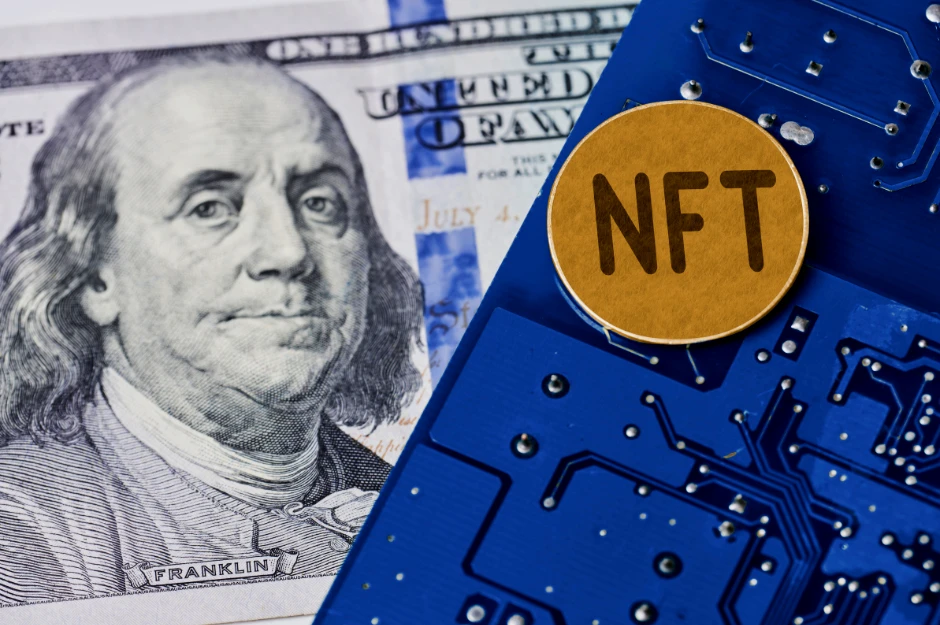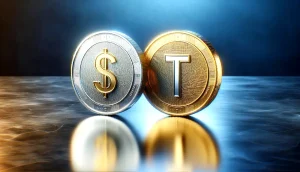The Rise of NFTs in the World of Investments: Exploring the Unique Properties and Potential of Non-Fungible Tokens
Introduction Non-fungible tokens (NFTs) have rapidly gained popularity and become a notable trend in the world of investments. These digital assets have unique properties that set them apart from other forms of digital currency and have captured the interest of both investors and creators alike. This article will discuss the unique properties of NFTs, showcase key statistics demonstrating their growth, and explore their potential as an investment opportunity.
Understanding NFTs: The Unique Properties of Non-Fungible Tokens
NFTs are digital tokens representing ownership of a unique asset, such as artwork, virtual real estate, or collectibles. Unlike cryptocurrencies like Bitcoin, NFTs cannot be exchanged on a one-to-one basis, as each NFT represents a distinct and unique item. NFTs are based on blockchain technology, which ensures the provenance, ownership, and transferability of these digital assets. The value of NFTs lies in their rarity, uniqueness, and digital ownership. As the world becomes increasingly digital, the demand for digital assets that can be owned and traded securely has grown significantly.
The Growth and Popularity of NFTs: Key Statistics
The popularity of NFTs can be seen in various statistics that demonstrate their rapid growth and increasing interest among investors:
- • NFT market cap in 2021 was $41 billion
- • NFT trading volume in 2021 exceeded $23 billion
- • Q3 2021 NFT trading volume was over $10 billion
- • NFT sales in the art segment reached 30,000 sales, totaling around $36.1 million in just 30 days (April 2023)
- • Millennials are 3 times more likely to buy and sell NFTs than Gen Z
- • The number of wallets trading NFTs in 2021 reached 28.6 million
- • The increase in NFT trading wallets from 2020 to 2021 was massive, growing from 545,000 to 28.6 million
NFTs as an Investment Opportunity
NFTs present investment opportunities in various sectors, including art, gaming, and collectibles. Some investors have experienced high returns in the NFT market, but it’s essential to understand that the market can be volatile and risky. As with any investment, thorough research and understanding of the market are crucial before diving in.
NFTs present investment opportunities in various sectors, including art, gaming, and collectibles. Some investors have experienced high returns in the NFT market, such as the $69 million sale of Beeple’s digital artwork “Everydays: The First 5000 Days” or the $2.9 million sale of CryptoPunk #7804. However, it’s essential to understand that the market can be volatile and risky. As with any investment, thorough research and understanding of the market are crucial before diving in.
How to Get Started with NFT Investing
For those interested in NFT investing, it’s essential to:
- • Choose the right NFT platform and create a digital wallet
- • Conduct thorough research and gain an understanding of the NFT market
- • Diversify your NFT portfolio to mitigate risks associated with the volatility of the market
Navigating the NFT Market: Tips for Success
As with any investment, it’s important to approach the NFT market with a strategy to maximize your chances of success. Here are some tips to help you navigate the world of NFT investing:
- -Understand the Creator and Community When investing in NFTs, it’s crucial to research the creator and the community behind the project. A strong community and a reputable creator can contribute to the long-term success and value of an NFT.
- -Look for Rarity and Scarcity NFTs with limited supply or those that possess unique traits often hold more value in the market. Ensure you understand the rarity and scarcity of the NFT you’re considering investing in.
- -Stay Updated on Market Trends The NFT market is constantly evolving, and staying informed on the latest trends can help you make better investment decisions. Keep an eye on news and developments within the NFT space to stay ahead of the curve.
- -Consider Utility and Functionality Some NFTs offer additional utility or functionality beyond their digital ownership, such as virtual land with the potential for development or in-game items that provide value to players. NFTs with added utility may offer more significant long-term potential for investors.
- -Be Prepared for Volatility The NFT market can be volatile, with prices of NFTs potentially experiencing rapid fluctuations. It’s important to be prepared for this volatility and have a clear investment plan that accounts for potential risks.
- -Diversify your NFT portfolio: Just like traditional investments, it’s important to diversify your NFT holdings to minimize risk and maximize potential returns.
- -Evaluate the underlying technology: Consider the blockchain platform used by the NFT project, as it can impact the project’s long-term viability and potential for growth.
- -Be cautious of hype and speculation: Be wary of investing in NFT projects solely based on hype, as it can lead to inflated valuations and potential losses if the market corrects.
Exploring the Potential of NFTs in Various Sectors
The potential of NFTs goes beyond just digital art and collectibles. Various industries are exploring the use of NFTs, and here are some notable examples:
- -Real Estate: NFTs can be used to represent fractional ownership of physical properties, enabling investors to buy and sell shares of real estate assets without the need for traditional intermediaries.
- -Sports and Entertainment: Sports teams and celebrities are leveraging NFTs to create digital memorabilia, unique fan experiences, and even virtual tickets for events.
- -Fashion: Luxury brands and designers are creating digital clothing and accessories as NFTs, allowing users to showcase their virtual wardrobes in online platforms and metaverse environments.
- -Gaming: NFTs are being integrated into video games as unique in-game items, characters, and virtual land, providing players with digital assets that can be bought, sold, and traded.
- -Intellectual Property: NFTs can be used to represent ownership of intellectual property rights, such as patents, trademarks, and copyrights, streamlining the process of licensing and monetization.
Risks and Challenges Associated with NFT Investing
Despite the potential and growing popularity of NFTs, it’s essential to be aware of the risks and challenges associated with investing in this emerging market:
- -Market Volatility: The NFT market is known for its price volatility, with values of individual tokens potentially experiencing drastic fluctuations over short periods. Investors should be prepared for this unpredictability and manage their risk accordingly.
- -Lack of Regulation: The NFT market is still relatively unregulated, which can lead to potential issues related to fraud, scams, and counterfeit tokens. Investors should conduct thorough due diligence before entering any NFT transactions.
- -Technological Risks: The underlying technology of NFTs, blockchain, is still evolving and may face future challenges, such as security vulnerabilities, scalability issues, and potential changes in the regulatory environment.
- -Illiquidity: Some NFTs may not have a readily available market for buying and selling, making it difficult for investors to liquidate their holdings if needed.
- -Environmental Concerns: The energy consumption of blockchain technology and NFTs has raised concerns about their environmental impact. Some platforms and projects are working to address this issue by utilizing more energy-efficient blockchain protocols or implementing carbon offset programs.
NFT Marketplaces and Platforms
To invest in NFTs, investors will need to access various marketplaces and platforms. Some of the most popular NFT marketplaces include:
- -OpenSea: A leading decentralized NFT marketplace, offering a wide range of digital assets, including art, virtual land, and collectibles.
- -Rarible: A community-owned NFT marketplace, allowing users to create, buy, and sell unique digital assets across various categories.
- -SuperRare: A high-end NFT platform focused on digital art, offering a curated selection of unique and limited edition pieces.
- -NBA Top Shot: A popular platform for buying, selling, and trading officially licensed NBA collectible highlights as NFTs.
TAX implications for NFT investments
Investing in NFTs may have tax implications, depending on your jurisdiction. In many countries, NFT transactions are subject to capital gains tax, and the specific rules and regulations may vary. It’s important to consult with a tax professional to understand the tax implications of buying, selling, and trading NFTs in your country. Proper record-keeping and documentation of NFT transactions can help ensure compliance with tax obligations and avoid potential penalties.
Final Thoughts
While the NFT market is still relatively young and evolving, its rapid growth and increasing adoption across various industries emphasize its potential as an investment opportunity. As blockchain technology advances and NFTs become more integrated into different sectors, the market for non-fungible tokens is expected to expand further, presenting new and exciting opportunities for investors.
By staying informed and adopting a strategic approach, investors can navigate the NFT market and potentially benefit from this emerging asset class. NFTs have undoubtedly made their mark in the investment world, offering unique properties and potential for those seeking alternative assets. By understanding market dynamics, risks, and potential, and adopting a strategic approach, investors can better position themselves to capitalize on this emerging market’s opportunities.
As the NFT market evolves, it’s crucial for investors to stay informed about new developments, emerging platforms, and innovative use cases to maximize their NFT investments. By staying vigilant and following best practices, investors can navigate the world of NFTs and potentially achieve success in this burgeoning space.
“How do NFTs differ from traditional cryptocurrencies?”
NFTs represent unique digital assets and cannot be exchanged on a one-to-one basis like cryptocurrencies. They are based on blockchain technology and derive value from their rarity, uniqueness, and digital ownership.
“What are the key sectors for NFT investments?”
NFTs have investment potential in various sectors, including art, gaming, collectibles, real estate, sports and entertainment, fashion, and intellectual property. Each sector offers unique opportunities and risks for investors.
“What are some risks and challenges associated with NFT investing?”
NFT investing involves risks such as market volatility, lack of regulation, technological risks, and illiquidity. Additionally, environmental concerns related to energy consumption and tax implications are essential factors to consider.








